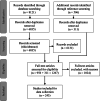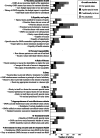A systematic review of moral reasons on orphan drug reimbursement
- PMID: 34193232
- PMCID: PMC8247078
- DOI: 10.1186/s13023-021-01925-y
A systematic review of moral reasons on orphan drug reimbursement
Abstract
Background: The number of market approvals of orphan medicinal products (OMPs) has been increasing steadily in the last 3 decades. While OMPs can offer a unique chance for patients suffering from rare diseases, they are usually very expensive. The growing number of approved OMPs increases their budget impact despite their low prevalence, making it pressing to find solutions to ethical challenges on how to fairly allocate scarce healthcare resources under this context. One potential solution could be to grant OMPs special status when considering them for reimbursement, meaning that they are subject to different, and less stringent criteria than other drugs. This study aims to provide a systematic analysis of moral reasons for and against such a special status for the reimbursement of OMPs in publicly funded healthcare systems from a multidisciplinary perspective.
Results: With a systematic review of reasons, we identified 39 reasons represented in 243 articles (scientific and grey literature) for and against special status for the reimbursement of OMPs, then categorized them into nine topics. Taking a multidisciplinary perspective, we found that most articles came from health policy (n = 103) and health economics (n = 49). More articles took the position for a special status of OMPs (n = 97) than those against it (n = 31) and there was a larger number of reasons identified in favour (29 reasons) than against (10 reasons) this special status.
Conclusion: Results suggest that OMP reimbursement issues should be assessed and analysed from a multidisciplinary perspective. Despite the higher occurrence of reasons and articles in favour of a special status, there is no clear-cut solution for this ethical challenge. The binary perspective of whether or not OMPs should be granted special status oversimplifies the issue: both OMPs and rare diseases are too heterogeneous in their characteristics for such a binary perspective. Thus, the scientific debate should focus less on the question of disease prevalence but rather on how the important variability of different OMPs concerning e.g. target population, cost-effectiveness, level of evidence or mechanism of action could be meaningfully addressed and implemented in Health Technology Assessments.
Keywords: Allocation of resources; Ethics; Orphan diseases; Orphan drugs; Publicly funded healthcare systems; Rare diseases; Reimbursement; Systematic review of reasons.
Conflict of interest statement
MRB received a research fund from Nutricia and is a member of the clinical advisory boards of Hemoshear and Moderna. BMZ and JE declare no conflicts of interest.
Figures
Similar articles
-
Home treatment for mental health problems: a systematic review.Health Technol Assess. 2001;5(15):1-139. doi: 10.3310/hta5150. Health Technol Assess. 2001. PMID: 11532236
-
A rapid and systematic review of the clinical effectiveness and cost-effectiveness of topotecan for ovarian cancer.Health Technol Assess. 2001;5(28):1-110. doi: 10.3310/hta5280. Health Technol Assess. 2001. PMID: 11701100
-
Cost-effectiveness of using prognostic information to select women with breast cancer for adjuvant systemic therapy.Health Technol Assess. 2006 Sep;10(34):iii-iv, ix-xi, 1-204. doi: 10.3310/hta10340. Health Technol Assess. 2006. PMID: 16959170
-
Surveillance of Barrett's oesophagus: exploring the uncertainty through systematic review, expert workshop and economic modelling.Health Technol Assess. 2006 Mar;10(8):1-142, iii-iv. doi: 10.3310/hta10080. Health Technol Assess. 2006. PMID: 16545207
-
Survivor, family and professional experiences of psychosocial interventions for sexual abuse and violence: a qualitative evidence synthesis.Cochrane Database Syst Rev. 2022 Oct 4;10(10):CD013648. doi: 10.1002/14651858.CD013648.pub2. Cochrane Database Syst Rev. 2022. PMID: 36194890 Free PMC article.
Cited by
-
Gene Therapy for Neuromuscular Diseases: Health Economic Challenges and Future Perspectives.J Neuromuscul Dis. 2022;9(6):675-688. doi: 10.3233/JND-221540. J Neuromuscul Dis. 2022. PMID: 36314216 Free PMC article. Review.
-
Moving beyond the Court of Public Opinion: A Citizens' Jury Exploring the Public's Values around Funding Decisions for Ultra-Orphan Drugs.Int J Environ Res Public Health. 2022 Dec 30;20(1):633. doi: 10.3390/ijerph20010633. Int J Environ Res Public Health. 2022. PMID: 36612953 Free PMC article.
-
Real-world use of orphan medicinal products (OMPs) in rare disease (RD) patients: A population-based registry study.Front Pharmacol. 2022 Sep 30;13:940010. doi: 10.3389/fphar.2022.940010. eCollection 2022. Front Pharmacol. 2022. PMID: 36249759 Free PMC article.
-
Inequities in kidney health and kidney care.Nat Rev Nephrol. 2023 Nov;19(11):694-708. doi: 10.1038/s41581-023-00745-6. Epub 2023 Aug 14. Nat Rev Nephrol. 2023. PMID: 37580571 Review.
-
Costs of orphan medicinal products: longitudinal analysis of expenditure in Wales.Orphanet J Rare Dis. 2023 Nov 1;18(1):342. doi: 10.1186/s13023-023-02956-3. Orphanet J Rare Dis. 2023. PMID: 37915031 Free PMC article.
References
-
- Regulation (EC) No 847/2000 of 27 April 2000; 2000 [cited 2021 Jan 19]. https://eur-lex.europa.eu/legal-content/EN/TXT/HTML/?uri=CELEX:32000R084....
-
- Electronic Code of Federal Regulations (eCFR): Title 21 Part 316; 2013 [cited 2021 Jan 19]. https://www.ecfr.gov/cgi-bin/text-idx?SID=55067b2d8804816620c10025d0362b....
-
- Orphan Drug Act; 1983 [cited 2021 Jan 14]. https://www.govinfo.gov/content/pkg/STATUTE-96/pdf/STATUTE-96-Pg2049.pdf.
-
- Regulation (EC) No 141/2000 of the European Parliament and of the Council of 16 December 1999 on orphan medicinal products; 1999 [cited 2021 Jan 19]. https://eur-lex.europa.eu/legal-content/EN/TXT/HTML/?uri=CELEX:32000R014....
Publication types
MeSH terms
LinkOut - more resources
Full Text Sources
Medical




